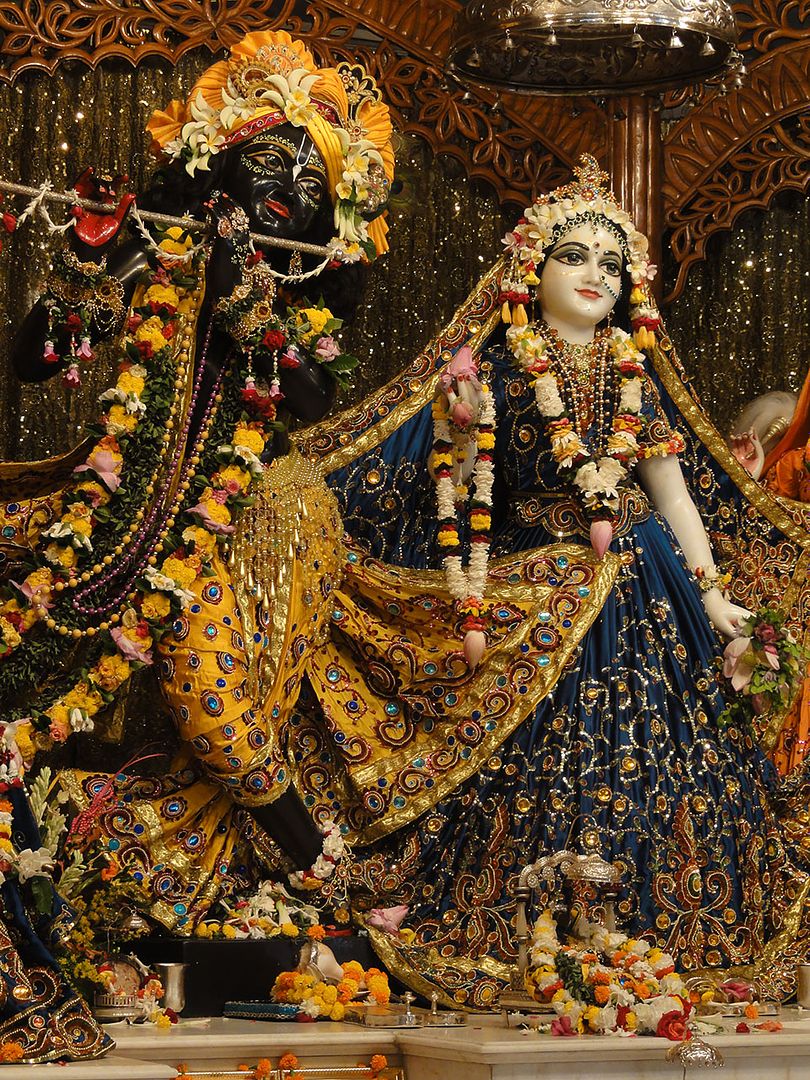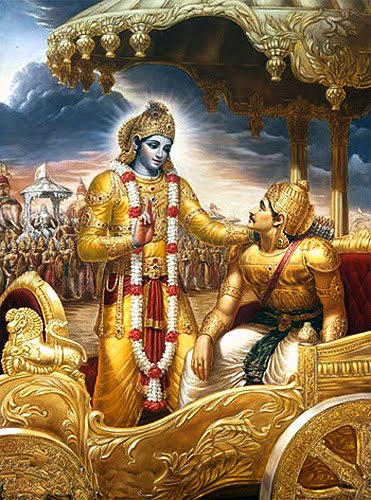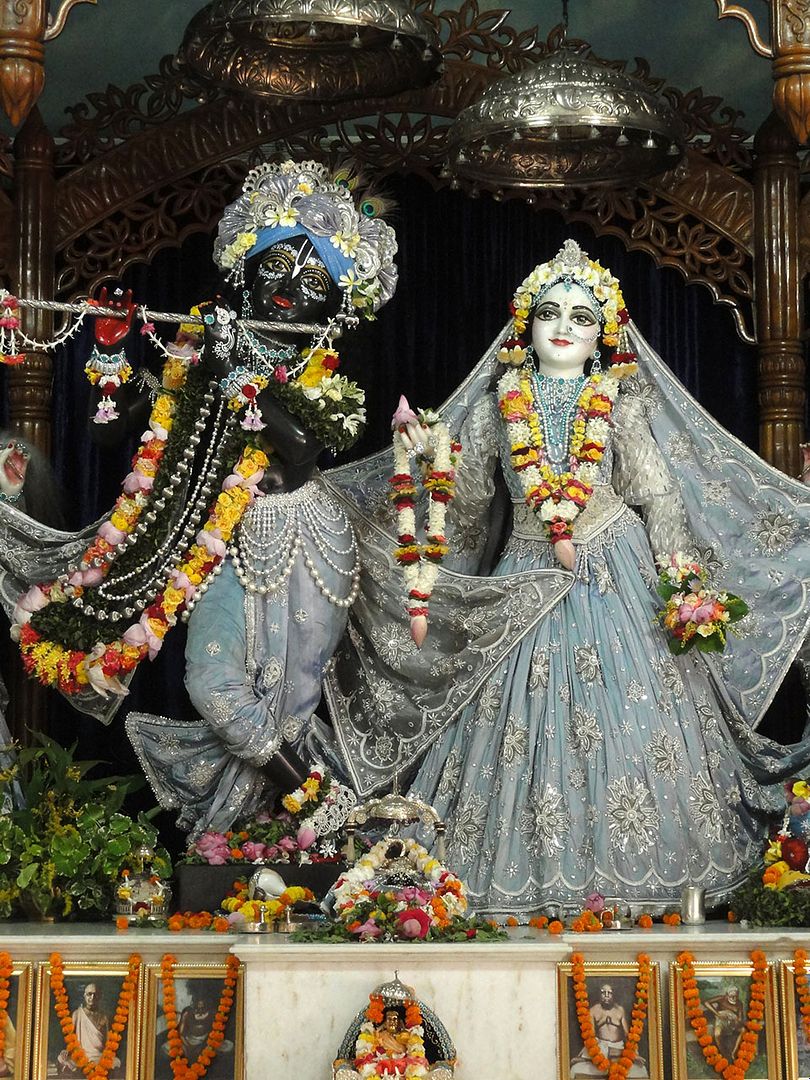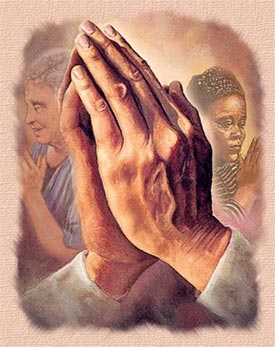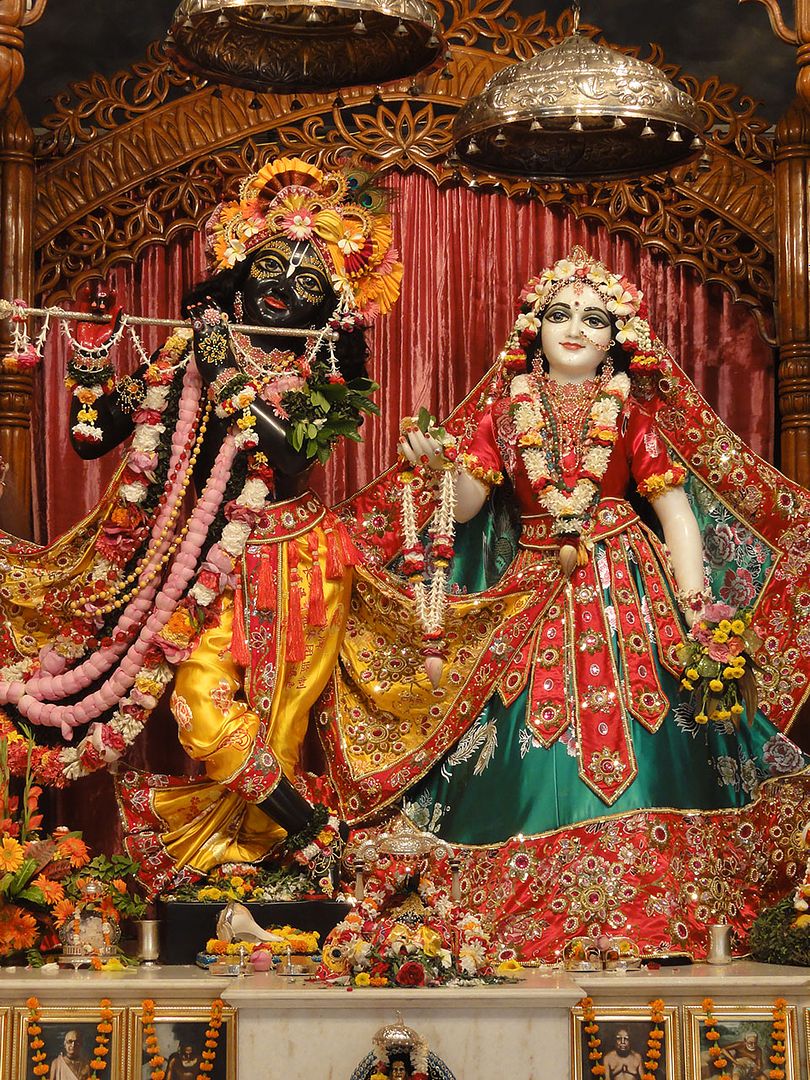
kadacit kalindi-tata-vipina-sangita-taralo
mudabhiri-nari-vadana-kamalasvada-madhupah
rama-shambhu-brahmamara-pati-ganesha-arcita-pado
jagannatha svami nayana-patha-gami bhavatu me (1)
Who sometimes fervently plays His flute on the banks of the Yamuna river in Sri Vrindavana, who is like a bumblebee that blissfully tastes the lotus faces of the Vraja-gopis, and whose feet are worshipped by great personalities such as Laksmi, Shiva, Brahma, Indra, and Ganesha -- may that Sri Jagannatha-deva be the object of my vision.
bhuje savye venum shirasi shikhi-piccham katitate
dukulam netrante sahacara-kataksham ca vidadhat
sada srimad-vrindavana vasati-lila-paricayo
jagannatha svami nayana-patha-gami bhavatu me (2)
Who holds a flute in His left hand, who wears a peacock feather on His head and a fine yellow silken cloth around His hips, who from the corners of His eyes bestows loving sidelong glances upon His companions, and who is forever known as the one who performs wondrous pastimes in the divine abode of Sri Vrindavana -- may that Sri Jagannatha-deva be the object of my vision.
mahambhodhes-tire kanaka-rucire nila-shikhare
vasan prasadantah sahaja-valabhadrena balina
subhadra-madhyasthah sakala-sura-sevavasara-do
jagannatha svami nayana-patha-gami bhavatu me (3)
Who on the shore of the great ocean resides in a palace situated on the gold-like crest of Nilachala Hill accompanied by His powerful brother Baladevaji and between Them, His sister Subhadra, and who bestows the opportunity to serve Him upon all the demigods -- may that Sri Jagannatha-deva be the object of my vision.
kripa-paravarah sajala-jalada-shreni-ruciro
rama-vani-ramah sphurad-amala-pankeruha-mukhah
surendrair-aradhyah shruti-gana-sikha-gita-carito
jagannatha svami nayana-patha-gami bhavatu me (4)
Who is an ocean of mercy, whose bodily complexion is as beautiful as a row of blackish rainclouds, who sports with Laksmi-devi and Sarasvati, whose face is like a spotless fully-blossomed lotus, who is worshipped by the foremost demigods, and whose transcendental glories have been sung in the topmost scriptures -- may that Sri Jagannatha-deva be the object of my vision.
ratharudho gacchan pathi milita-bhudeva patalaih
stuti-pradurbhavam prati-padam-upakarnya shadayah
daya-sindhur-bandhuh sakala-jagatam sindhu-sutaya
jagannatha svami nayana-patha-gami bhavatu me (5)
When Jagannatha's Ratha-yatra cart is moving along the road, at every step assemblies of brahmanas sing His praises. Upon hearing them, Jagannatha, being an ocean of mercy and the true friend of all the worlds, becomes favourably disposed towards them -- may that Sri Jagannatha-deva be the object of my vision.
param-brahmapidah kuvalaya-dalotphulla-nayano
nivasi niladrau nihita-carano ananta-shirasi
rasanandi radha-sarasa-vapur-alingana-sukho
jagannatha svami nayana-patha-gami bhavatu me (6)
Who is the crown-jewel of transcendence, whose eyes are like the petals of a fully-opened blue lotus, who resides at Nilachala, whose feet are placed on the head of Sesa, who is blissfully immersed in bhakti-rasa, and who derives happiness from embracing the rasa-laden body of Srimati Radhika -- may that Sri Jagannatha-deva be the object of my vision.
na vai yace rajyam na ca kanaka-manikya-vibhavam
na yace 'ham ramyam sakala-jana-kamyam vara-vadhum
sada kale kale pramatha-patina gita-carito
jagannatha svami nayana-patha-gami bhavatu me (7)
I do not pray to Jagannatha for a kingdom, nor for gold, jewels, wealth, or even for a beautiful wife as desired by all men. My only prayer is that Sri Jagannatha-deva, whose splendid glories are always sung by Shiva, be the constant object of my vision.
hara tvam samsaram drutataram-asaram sura-pate!
hara tvam papanam vitatim-aparam yadava-pate!
aho dine 'nathe nihita-carano nishcitam-idam
jagannatha svami nayana-patha-gami bhavatu me (8)
O master of the demigods! Quickly deliver me from this worthless worldly existence. O Lord of the Yadus! Purge me of my limitless host of sins. Aho! You have promised to bestow Your feet upon the fallen and shelterless -- O Jagannatha Swami, please be the object of my vision.
jagannathastakam punyam yah pathet prayatah shuci
sarva-papa-vishuddha-atma vishnulokam sa gacchati
One who carefully recites this sacred Jagannathastakam, upon becoming sinless and purehearted, will attain entrance into Vishnuloka.



